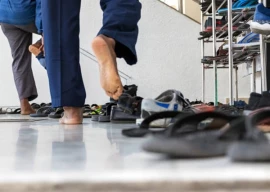
KARACHI:
Abbas Ali, a resident of Dadu, can probably think of many things that people in Karachi take for granted, but which residents from his district continue to be deprived of.
However, he has not lost all hope; he thinks of his school-going children as ‘agents of change.’ The children arrived from school one day and asked their mother to wash her hands before kneading dough.
The change might have been a result of a project, launched in January 2009, by the Indus Resource Centre (IRC), with support from Water Aid, which was aimed to promote water, sanitation and hygiene (WASH) habits across 30 public schools in Dadu district. The project concluded this month.
IRC organised a seminar on the World Water Day to present the findings of the project. Students, their parents and teachers from Dadu attended the event and shared their experiences with the audience, which included members of the civil society and the government.
“Sadiqa Salahuddin (executive director of the IRC) has taught us to stand up for our rights,” said Ali.
Salahuddin said that IRC’s pilot project could be replicated by the government and other non-government organisations (NGOs). “Its implementation did not cost a lot of money, and yielded positive results in terms of infrastructural development and behavioural change.”
IRC’s Bakht Brahmani presented an overview of water and sanitation facilities in 120 schools in Dadu. Nearly 46 schools had no provision for drinking water, and 68 schools that had water storage tanks, never cleaned them. Hardly 66 toilets were available for use by students in these schools, while only 19 of them got cleaned on a daily basis.
The IRC also established several “WASH” groups, each consisting of four students. Amjad Ali, a student, said “We saw a lot of things change during the course of these three years.”
The IRC also tried to engage communities into the project. “We organised committee meetings consisting of parents and members of schools’ management, and stressed upon them the importance of sanitation and hygiene,” said Barahmani.
When the project concluded, 29 of the 30 schools had toilets and 22 had facilities for provision of clean drinking water.
Salahuddin said that the IRC had also learnt lessons. “WASH remains a neglected area in education in the country, since NGOs focus on non-availability of teachers, condition of classrooms and on enrollment issues.”
Published in The Express Tribune, March 24th, 2012.





























































COMMENTS
Comments are moderated and generally will be posted if they are on-topic and not abusive.
For more information, please see our Comments FAQ